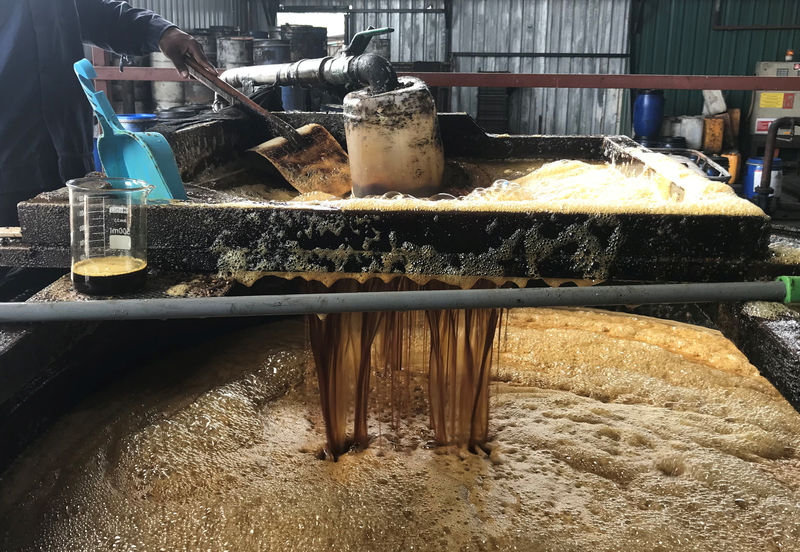By Emily Chow
KUALA LUMPUR (Reuters) - Once surreptitiously dumped down drains in the dead of night, Asia's used cooking oil is fast becoming one of the most sought-after commodities in Europe - as a feedstock for biodiesel.
Aggressive green energy targets in the European Union that were bolstered further this year are pushing fuel makers to churn out biodiesel containing recycled cooking oils and fats, phasing out the use of fresh vegetable oils in the process by 2030.
That has unleashed a wave of demand for used oil from places such as China and Southeast Asia, where cooking oils are widely used to prepare everything from stir-fries to piping hot samosas.
Amizuri Abdullah, who picks up used oil from restaurants, fast food outlets and food factories for Malaysian waste oil collection firm FatHopes Energy, said his job had been getting markedly busier.
"When I first joined the company a year ago, there were about 15 or 16 stops to make in a day. Now there can be as many as 25, and more people are asking about it," said Amizuri, who wears bright blue protective gloves to pump used oil into a tank on the back of his truck on the outskirts of Kuala Lumpur.
The oil is unloaded at a collection center where it is filtered to remove food scraps like chicken bones and skin, before being processed to reduce contamination. It is then transferred into tankers for export to Europe.
FatHopes Chief Executive Vinesh Sinha said the company's exports of waste-based feedstock to European oil majors had grown 40 percent in the last three years, forecasting a threefold increase in Europe's demand for such feedstock by 2030.
Used cooking oil makes up a good chunk of what the company collects from thousands of sites across Southeast Asia, but it also buys coffee grinds, animal fats and palm oil mill waste.
"My clients are struggling to find feedstock in anticipation of the EU policy," he said.
(GRAPHIC: Biodiesel production by region since 2000 - https://tmsnrt.rs/2oYrmJI)
GOING UP
Asia's used cooking oil industry was estimated to be worth around $500 million a couple of years ago, but analysts said more recent estimates were not available due to the rapid growth in the number of new collectors and traders.
Justin Yuan, chief executive of the used cooking oil division at Chinese consulting company STIN Group, said shipments from China would likely hit 300,000 tonnes this year, up from 200,000 tonnes in 2017.
He said most cargoes go to Europe and that volumes were set to keep surging in coming years.
"More overseas biodiesel plants will source used cooking oil in China. With soaring demand from home and abroad, it will put great pressure on used cooking oil supplies," Yuan said. "The competition will be fiercer."
Indeed, waste oil demand is already outstripping supply around Asia, with traders estimating that the premium it fetches over crude palm oil prices has doubled from around two years ago to stand at about 10-15 percent.
Used cooking oil is traded at prices pegged to crude palm oil, typically trading at a premium due to its greener credentials. Traders said it currently cost around $600-700 a tonne on average.
That appetite is also good news for the thousands of restaurants and other businesses where the used oil is collected, which typically earn around 40 U.S. cents per kilo of the commodity.
Analysts said that in the past many restaurants and food manufacturers poured old oil down the drain when the time came to replace it, often breaking rules designed to protect sewage systems that are very difficult to enforce.
FAT-FINDING MISSION
Today, collectors are competing to lock up supplies from around the region to feed expanding biofuel operations in Europe.
In June, the European Union agreed to phase out crude vegetable oils usage in transport fuel from 2030 as part of a broader plan to increase the share of renewables in the bloc's energy production.
"The industry here (in Asia) is about whether you have the capacity to get more oil. Competition is very fierce now, so the margins we have are little," said Rick Ng, business advisor for Singaporean waste oil collector Go Green Recycle Oil.
In May, French oil major Total said waste material would account for 30-40 percent of feedstock supplies at its new 650,000 tonnes capacity biofuel refinery in southern France.
Britain-based biofuel supplier Greenergy in July acquired an idle vegetable oil processing plant in Amsterdam to turn waste oil into biodiesel.
Greenergy, Europe's largest producer of biofuels made from waste, in September also acquired Singapore-based used cooking oil exporter Rexon Energy to help secure raw material supplies.
Meanwhile, Finnish biofuel producer Neste told Reuters by email that it was planning to double its waste-based refining capacity in Singapore to 2 million tonnes.
All that means that Amizuri back at FatHopes Energy in Kuala Lumpur could be set to get busier.
"I think there is going to be more used cooking oil collected as awareness that it can be recycled rises. I think this industry is going to grow," he said.
"Instead of throwing it out, collect and sell it. There is value there."
(This version of the story was refiled to correct spelling error in 3rd paragraph)
